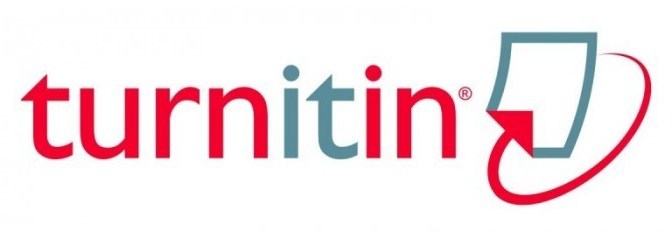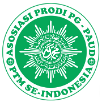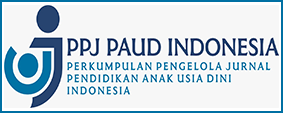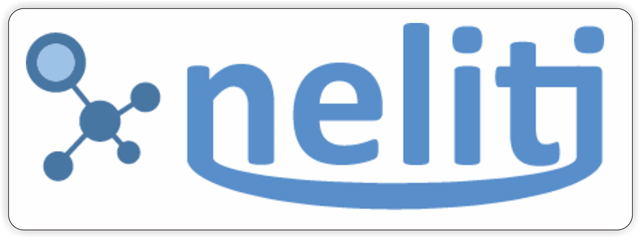Application of Science, Technology, Engineering, Art, and Mathematics to Improve Critical Thinking Skills of Children Aged 4-5 Years
(1) Universitas Islam Makassar, Indonesia
(2) Universitas Islam Makassar, Indonesia
(3) Universitas Islam Makassar, Indonesia
(4) University Ohio, United States
(*) Corresponding Author
DOI: https://doi.org/10.26858/tematik.v9i2.47960
Abstract
Keywords
Full Text:
PDFReferences
Amaluddin. (n.d.). Model Pembelajaran Problem Base Learning Penerapan dan Pengaruhnya Terhadap Keterampilan Berpikir Kritis dan Hasil Belajar. Pascal Books.
Bredekamp, S. E., & Copple, C. E. (1997). Developmentally Appropriate Practice in Early Childhood Programs. (Revised Edition). Washington, DC: National Association for the Education of Young Children, 130.
Farwati, R., Metafisika, K., Sari, I., Sitinjak, D. S., Solikha, D. F., & Solfarina, S. (2021). STEM Education Implementation in Indonesia: A Scoping Review. International Journal of STEM Education for Sustainability, 1(1), 11–32. https://doi.org/10.53889/ijses.v1i1.2
Fauzia, W. (n.d.). Perkembangan Kognitif Anak Usia Dini. In Sigi: Feniks Muda Sejahtera.
Fernández-Santín, M., & Feliu-Torruella, M. (2020). Developing critical thinking in early childhood through the philosophy of Reggio Emilia. Thinking Skills and Creativity, 37, 100686. https://doi.org/10.1016/J.TSC.2020.100686
Hakim, A. L. (n.d.). Keterampilan Pembelajaran Abad 21: Menuju SDM Unggul dan Tangguh. Adab.
Halim, A. (2022). Signifikansi dan Implementasi Berpikir Kritis dalam Proyeksi Dunia Pendidikan Abad 21 Pada Tingkat Sekolah Dasar. Jurnal Indonesia Sosial Teknologi, 3(03), 404–418. https://doi.org/10.59141/JIST.V3I03.385
Hamalik, O. (n.d.). Proses Belajar Mengajar. PT Bumi Aksara.
Heldanita, H., Marlisa, W., Ramadora, N., Bakhtiar, N., Mukhtar, N., Nurhayati, N., & Utami, W. T. (2023). Practical Analysis of Cognitive Theory on Early Childhood Development. KINDERGARTEN: Journal of Islamic Early Childhood Education, 5(2), 309–317. https://doi.org/10.24014/KJIECE.V5I2.22231
Hurlock, E. B. (1978). Perkembangan anak. In Erlangga. https://opac.perpusnas.go.id/ DetailOpac.aspx?id=97807
Imamah, Z., & Muqowim. (n.d.). Pengembangan Kreativitas dan Berpikir Kritis Pada Anak Usia Dini melalui Metode Pembelajaran Berbasis STEAM and Loose Part. Yinyang, 15(2). https://doi.org/10.24090/yinyang.v15i2.3917
Kembara, M. D., Wijaya, R., Rozak, A., & Hadian, V. A. (2019). Research-based Lectures to Improve Students’ 4C (Communication, Collaboration, Critical Thinking, and Creativity) Skills. 22–26. https://doi.org/10.2991/ISSEH-18.2019.6
Khaironi, M. (2018). Perkembangan Anak Usia Dini. Jurnal Golden Age, 2(01), 01–12. https://doi.org/10.29408/GOLDENAGE.V2I01.739
Lismaya, L. (n.d.). Berpikir Kritis & PBL. Media Sahabat Cendekia.
Natalia, D. (n.d.). Menumbuhkan Perilaku Berpikir Kritis Sejak Anak Usia Dini. Cakrawala Dini. Jurnal Pendidikan Anak Usia Dini, 6(1). https://doi.org/10.17509/cd.v6i1.10508
Nurfadillah, R. R., & Rakhman, A. (n.d.). Implementasi Metode STEAM Berbasis Media Film Dalam Meningkatkan Aspek Kognitif Pada Pendidikan Anak Usia Dini. Jurnal Ceria, 3(3). https://doi.org/10.22460/ceria.v3i4.p
Nurjanah, N. E., & Wahyuseptiana, Y. I. (2018). The Application Of Playing Based On Reggio Emilia’s Approach To Stimulate Early Childhood Creativity. Social, Humanities, and Educational Studies (SHES): Conference Series, 1(1), 555–561. https://doi.org/10.20961/SHES.V1I1.23600
Prameswari, T. W., & Lestaningrum, A. (n.d.). STEAM Based Learning Strategies by Playing Loose Part for Achievement of 4C Skills in Children 4-5 Years. Jurnal Efektor, 7(1). https://doi.org/10.29407/e
Priyanti, N., & Warmansyah, J. (2021). Improving Critical Thinking Skills of Early Childhood through Inquiry Learning. Jurnal Obsesi : Jurnal Pendidikan Anak Usia Dini, 5(2), 2241–2249. https://doi.org/10.31004/obsesi.v5i2.1168
Ramadan, W., Chamidah, N., Zaman, B., Muniroh, L., & Lestari, B. (2019). Standard Growth Chart of Weight for Height to Determine Wasting Nutritional Status in East Java Based on Semiparametric Least Square Spline Estimator. IOP Conference Series: Materials Science and Engineering, 546(5), 052063. https://doi.org/10.1088/1757-899X/546/5/052063
Roshayanti, F. (n.d.). Model Pembelajaran Berbasis STEAM Berorientasi Life Skills. NEM.
Roshayanti, F., Wijayanti, A., Purnamasari, V., & Setianingsih, E. S. (2022). Analysis of Understanding and Readiness of Elementary School Teachers on the Implementation of the STEAM (Science, Technology, Engineering, Arts, Mathematics) Approach. KnE Social Sciences, 2022, 125-135–125–135. https://doi.org/10.18502/KSS.V7I14.11960
Safira, A. R., & Ifadah, A. S. (n.d.). Pembelajaran Sains dan Matematika Anak Usia Dini. Caremedia Communication.
Sawyer, R. K. (Robert K. (2003). Creativity and development. 244.
Sihotang, K. (n.d.). Berpikir Kritis Kecakapan Hidup di Era Digital. PT Kanisius.
Simoncini, K., & Lasen, M. (2018). Ideas About STEM Among Australian Early Childhood Professionals: How Important is STEM in Early Childhood Education? International Journal of Early Childhood, 50(3), 353–369. https://doi.org/10.1007/S13158-018-0229-5/METRICS
Simoncini, K. M., Lasen, M., & Rocco, S. (2018). Early childhood pre-service teachers engage in collegial dialogue. Learning and Teaching Around the World: Comparative and International Studies in Primary Education, 153–162. https://doi.org/10.4324/9780429491498-19
Syafdaningsih, S., & Utami, F. (2021). The Introduction for Number Symbols in Children Aged 4-5 Years through Mathematics Play Activities. Indonesian Journal of Early Childhood Education Studies, 10(2), 96–102. https://doi.org/10.15294/IJECES.V10I2.44726
Tumanggor, M. (n.d.). Berfikir Kritis Cara Jitu Dalam Tantangan Pembelajaran Abad 21. Gracias Logis Kreatif.
Undang Undang Republik Indonesia Nomor 20 Tahun 2003 Tentang Sistem Pendidikan Nasional. (2003). Undang Undang Republik Indonesia Nomor 20 Tahun 2003 Tentang Sistem Pendidikan Nasional. Demographic Research, 49(0), 1-33: 29 pag texts + end notes, appendix, reference.
Wahyuseptiana, Y. I., Aje, D. P., & Widjanarko, P. (n.d.). STEAM Approach to Improving Critical Thinking Skills in Early Children. EJHEA, 3(9), 2660–5589. https://www.scholarzest.com
Widayati, A. (2008). Penelitian Tindakan Kelas. Jurnal Pendidikan Akuntansi Indonesia, 6(1). https://doi.org/10.21831/JPAI.V6I1.1793
Yafie, E., & Sutama, W. (n.d.). Pengembangan Kognitif Sains Pada Anak Usia Dini. Universitas Negeri Malang.
Article Metrics
Abstract view : 109 times | PDF view : 18 timesRefbacks
- There are currently no refbacks.
Copyright (c) 2023 Raodah Kusumawaty Ramli; Riskal Fitri; Andi Rezky Nurhidaya

This work is licensed under a Creative Commons Attribution-NonCommercial 4.0 International License.
Published by:
Program Studi Pendidikan Guru Pendidikan Anak Usia Dini, Fakultas Ilmu Pendidikan, Universitas Negeri Makassar
Kerjasama:
Support by:
Email: jurnal.tematik@unm.ac.id
p-ISSN: 2476 - 9363
e-ISSN: 2723 - 7613

TEMATIK: Jurnal Pemikiran dan Penelitian Pendidikan Anak Usia Dini is licensed under a Creative Commons Attribution-NonCommercial 4.0 International License.
View My Stats


























